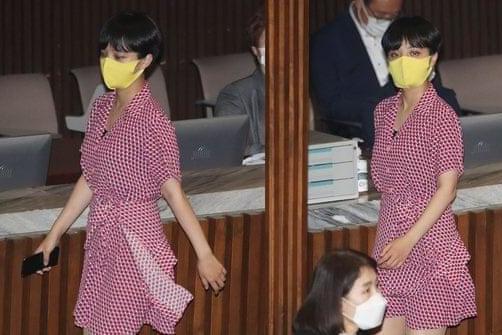'Soon she'll come to work in a bikini': South Korean MP criticised for wearing short-sleeved dress to parliament
Ryu Ho-Jeong has been met with online vitriol in country where only 19 per cent of parliamentarians are women

Your support helps us to tell the story
From reproductive rights to climate change to Big Tech, The Independent is on the ground when the story is developing. Whether it's investigating the financials of Elon Musk's pro-Trump PAC or producing our latest documentary, 'The A Word', which shines a light on the American women fighting for reproductive rights, we know how important it is to parse out the facts from the messaging.
At such a critical moment in US history, we need reporters on the ground. Your donation allows us to keep sending journalists to speak to both sides of the story.
The Independent is trusted by Americans across the entire political spectrum. And unlike many other quality news outlets, we choose not to lock Americans out of our reporting and analysis with paywalls. We believe quality journalism should be available to everyone, paid for by those who can afford it.
Your support makes all the difference.A female MP in South Korea has been met with outrage after she wore a colourful short-sleeved dress to a parliamentary session.
South Korean press described the shirt dress worn by Ryu Ho-Jeong, who is the youngest member of the national assembly, on Tuesday as a red “mini-dress”.
Vitriolic misogynistic comments about the 28-year-old’s outfit have flooded social media – with critics asking why she was worthy of being in parliament.
One critic said: ”Soon she’ll come to work in a bikini”. Another added: “Is this a bar?”
Ms Ryu, a member of the left-wing minority Justice Party, said she had deliberately chosen her outfit to disrupt the tradition of middle-aged men wearing suits in the 300-seat assembly where only 19 per cent of representatives are women.
“In every plenary session, most lawmakers, male and middle-aged, show up in a suit and a tie, so I wanted to shatter that tradition,” she told Yonhap, a South Korean news agency. “The authority of the national assembly is not built on those suits.”
The Justice Party hit out at the treatment she had been forced to endure – condemning critics for judging her on her appearance rather than her work.
”We cannot agree at all with the voice that paints a female politician as lacking qualification by evaluating her look and image rather than her legislative work,” the party said in a statement.
“Women lawmakers are still becoming targets of discussion for wearing pants, or choosing a bright-coloured outfit. We express regret at today’s reality in the National Assembly where overbearingly screaming at one another has become natural, while wearing a dress is considered an issue. We state that today is year 2020.”
Ko Min-jung, a member of the ruling party, heaped praise on Ms Ryu for “shattering the excessive rigour and authoritarianism” of the national assembly in a Facebook post.
Niki Kandirikirira, of Equality Now, an NGO promotinng the rights of women and girls, told The Independent: “The tirade of misogynistic comments posted on social media targeting Ryu Ho-jeong and her choice of attire is a barefaced demonstration of the sexism that women politicians endure in South Korea and elsewhere. Underpinning these types of disparaging remarks is the desire to belittle, trivialise and denigrate women in positions of power by judging them on the basis of appearance and attractiveness.
“The sexist criticism that Ryu Ho-jeong has received is a reflection of wider issues around gender inequality in South Korea, which ranks poorly for female representation in government by international standards. South Korean politicians from across the political spectrum should be seeking to overturn harmful patriarchal attitudes that foster gender discrimination wherever it manifests, including in government.
“Unfortunately, many women politicians around the world are all too familiar with being subjected to comments about their appearance in the media and social media. It is another example of the everyday sexism that women have to contend with, and this is not just a problem for women in politics. We need to move beyond a culture in which women in the workplace are objectified and defined by what they wear, and instead value them for the skills and expertise they bring to the job.”
Sexist criticism of Ms Ryu comes in the context of the “escape the corset” campaign which has seen women destroying their makeup and cutting their hair in protest against the nation’s stringent and unrealistic beauty standards, which sees flawless feminine beauty as being integral to success in career and relationships.
Record numbers of women have taken to the streets in recent years in South Korea – where patriarchal values are profoundly ingrained – to call for greater equality and to fight against issues such as illegal filming and sexual assault.
Join our commenting forum
Join thought-provoking conversations, follow other Independent readers and see their replies
Comments